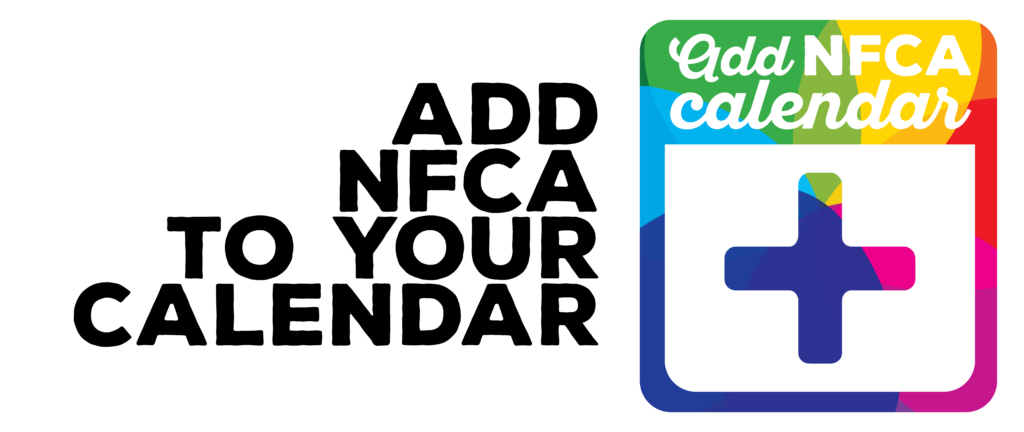
Was this newsletter forwarded to you? Subscribe here to keep up to date on NFCA News!
In this edition:
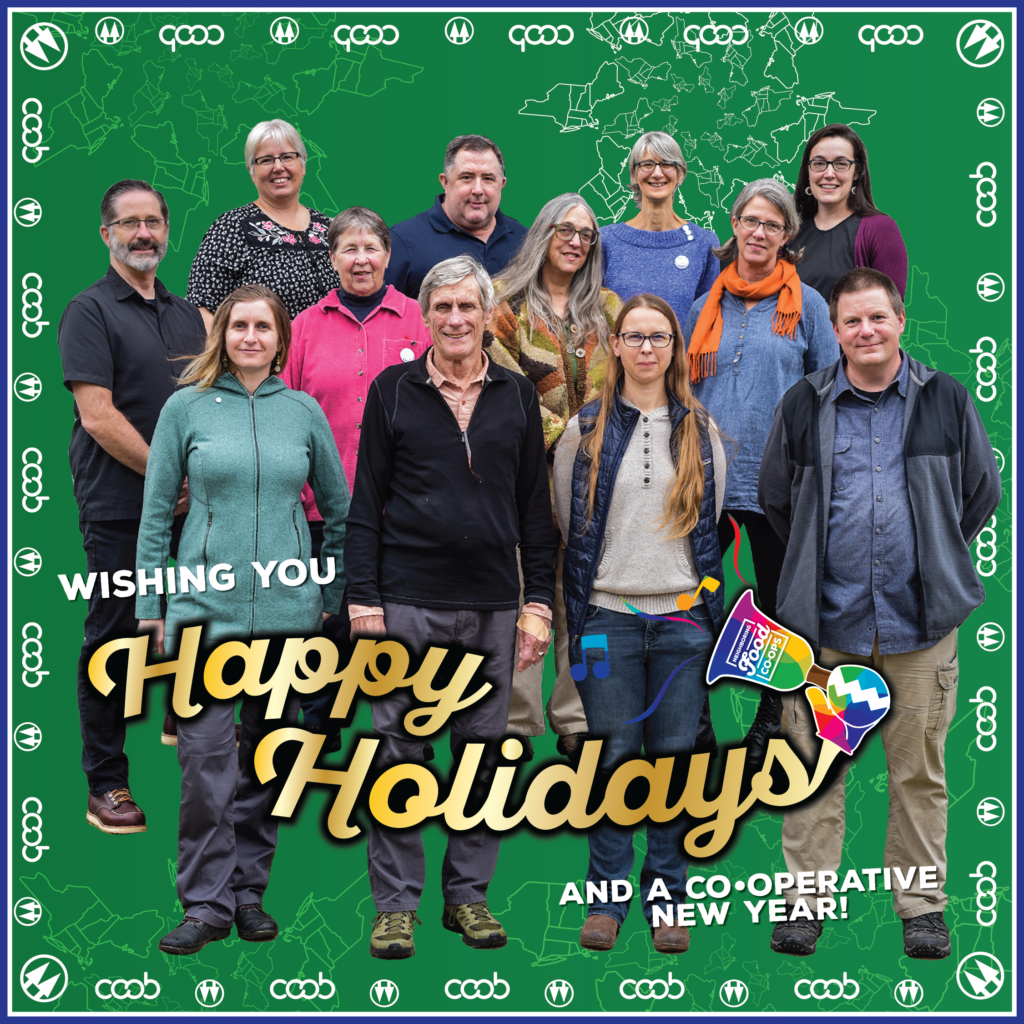
Gifts that Grow the Co-op Economy

As we gather to celebrate the holidays together, build on the legacy of the Rochdale Pioneers by giving the gift of co-operation.
Co-op gifts to share the bounty
Your local food co-ops offer many products that not only make great gifts but also help build a more healthy, just and sustainable food system and a stronger local economy:
- Make your own gift basket filled with Locally Made items or Personalized Themes for everyone on your list like these suggestions from GreenStar Co-op or Littleton Food Co-op’s Gift Guides or awesome offerings at Fiddleheads Food Co-op, or peruse the household department items in your co-op!
- Special Holiday Foods and Beverages and all of the ingredients you need for holiday celebrations, like artisan and regional special cheeses for creating the perfect cheese platter or cheese ball or pairing with La Riojana Co-op Wines available exclusively at food co-ops.
- Food as gifts, learn to make special foods to give as gifts or for shared meals. Check out your co-op’s cooking classes like Co-op Food Stores offerings or try something new like City Market’s livestream cooking and baking sessions or with the kids in Monadnock Co-op’s virtual series specially designed for young people.
- Share the Co-op Love. Can’t decide what to get your loved ones? Our co-ops like Portland Food Co-op have gift cards or gift of co-operation with a membership in your local food co-op or start-up like Assabet Co-op Market. Great for mailing too!
Co-op education gifts
Consider one of the many opportunities that our co-operative community has created that help leaders of all ages to access the training and information they need to be effective co-op members, board members and staff, including:
- The Cooperative Education Fund offers grants for the training and education of food co-op staff, managers, and board members. You can make a special charitable donation in honor of recipients of the NFCA’s “Neighboring Co-operator” award. Most recent honorees include Glenn Lower, former General Manager at Middlebury Natural Foods Co-op and JQ Hannah, Assistant Director at Food Co-op Initiative (FCI).
- The Co-operative Management Education program at Saint Mary’s University offers and online Master of Management program and in-person opportunities for co-operative professionals. You can support scholarship resources by giving online.
- The FCI Cooperative Futures Fund to support development of new co-ops. Make a donation in honor of a loved one contributing to effective learning, communicating and resource building to create new co-operatives.
However you choose to celebrate this season, you can find all of the ingredients you need for to bring joy to friends and family, whether near or far — and a more inclusive and sustainable community — at the co-op!
To find a food co-op near you and more co-op resources, please visit: https://nfca.coop/members
Rochdale Resource

The Rochdale Pioneers Museum is now housed in the building where the Rochdale Equitable Pioneers Society opened their first store. Toad Lane, Rochdale, Greater Manchester, England.
December 21 marks the anniversary of the opening of a co-op grocery store that has impacted our co-operative movement like no other. On the night of December 21, 1844, a group of community activists and working people opened a humble, community-owned grocery store in the North of England. Stocked only with basic items such as butter, oats and candles, the store was extremely modest at first, and many mocked their efforts at the time. But the Rochdale Society of Equitable Pioneers were not deterred, and the practices that they put in place at their successful co-op were later adopted by the International Co-operative Alliance (ICA), building on a movement for economic democracy that today includes more than a billion people around the world. Rooted in values such as democracy, equality and solidarity, co-ops empower people to meet the needs of their communities through democratically governed, community-owned enterprise.
Learn more about the contribution of the Rochdale Pioneers and why they are still relevant today in the webinar “Rochdale & The Early Co-operative Movement”. In this 23 minute video Erbin Crowell, Executive Director of the NFCA presents some of the background leading up to the establishment of the Rochdale Society of Equitable Pioneers, their challenges and impacts on other movements.
Education and training is a basic Principle of the Co-operative Identity, recognizing that the ability of the co-ops to empower people more in their economic lives depends on engaging “the general public — particularly young people and opinion leaders — about the nature and benefits of co-operation.”
This video is one of a series developed as a collaboration between the National Farmers Union and the NFCA with assistance from the Cooperative Development Foundation (CDF) to engage members, co-op employees, board members and community members about the co-operative difference. Each video has a series of thought provoking questions at the end to encourage reflection by the viewer about their own co-operative experience.
To view this video and others in the series visit: Co-operative Education Webinar Series.

Co-op Identity Consultation

Co-operation matters: Sharing the results of the international survey on the Co-operative Identity.
On 14 December, the Co-operative Identity Advisory Group of the International Co-operative Alliance (ICA) will present a webinar entitled ‘Co-operation Matters: Sharing the Results of the Survey on the Co-operative Identity’ where it will share the findings of international the survey on the Co-operative Identity.
At the 33rd World Cooperative Congress in 2021, the ICA kicked off a global consultative process aimed at finding out how well the Statement on the Co-operative Identity has stood the test of time. Co-operators around the world were invited to respond to a survey gathering opinions on whether our principles and values — our co-operative difference — is well defined and understood.
The webinar will be held virtually at 9:00 AM EST and will include a Q&A session to exchange views with panelists and other co-operators worldwide, as well as next steps on the Co-operative Identity Consultation.
Click here to register for the webinar. And for more information on the Co-operative Identity, visit https://ica.coop.
Cooperative Development Foundation
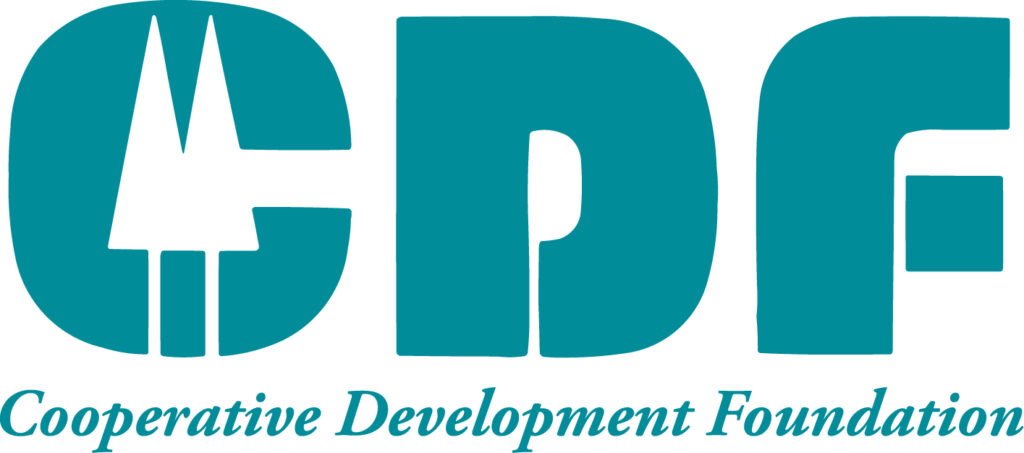
Building a Just Co-operative Ecosystem with the Cooperative Development Foundation
Based in Washington, DC, the Cooperative Development Foundation promotes self-help and mutual aid in community, economic, and social development through co-operative enterprise. CDF is a thought leader in the use of co-operatives to create resilient communities, including the housing and care needs of seniors and people living with disabilities.
Through its funds, fiscal sponsorships, and fundraising, CDF makes grants and loans that foster co-operative development domestically and abroad. Support for cooperative research, sponsorships of education events and scholarships, and development of education materials and programs are funded through the Cooperative Education Fund. The Cooperative Development Fund focuses on co-operative development, research, and technical assistance with particular emphasis on cooperatives serving the needs of seniors, providing affordable housing, and building resilience in the developing world. Through the Disaster Recovery Fund, CDF provides grants to co-operatives impacted by disaster.
Understanding the value of co-operative research, CDF also sponsors efforts to identify, understand, and break down the co-operative difference. For example, CDF partnered to publish the Diversity, Equity & Inclusion (DEI) Trends in the Cooperative Community report. This report was authored by Dr. Laura Hanson Schlachter, researcher at the University of Wisconsin Center for Cooperatives and based on a survey of National Cooperative Business Association CLUSA International (NCBA CLUSA) members.
Additionally, CDF hosts annual fundraising events to engage cooperators to further strengthen and honor our co-operative ecosystem. The Cooperative Hall of Fame honors co-operative heroes who have positively impacted and inspired co-operative efforts and serves as a major fundraise for the Foundation. The Co-op 5K is a fun, family- friendly fundraiser to support cooperative development nationwide.
A longtime partner of the Neighboring Food Co-op Association, in 2022 CDF supported the development of the NFCA’s co-operative education webinar series and the two organizations are working together to support small, rural food co-ops in the Northeast as they recover from the pandemic. This project, funded through the USDA Rural Cooperative Development grant, will continue in 2023 by providing technical support in governance, management and membership engagement and development. Our long-term partnership is also visible in NFCA’s consistent sponsorship of the Cooperative Hall of Fame and the Co-op 5K as well as CDF’s support for the NFCA’s Annual Meetings and educational activities.
Support the only foundation in the U.S. devoted solely to the development of co-operatives across sectors by making a year-end donation. Your contribution can position CDF to accomplish even more in 2023. It’s also not too early to join the Neighboring Co-operators Team for the Co-op 5K in April 2023 — or plan a team for your food co-op!
For more information on the Cooperative Development Foundation, visit https://cdf.coop.
December Cave-to-Co-op Special
This month’s special cheese is Red Sky, Sweet Rowen Farmstead, Glover, VT

Each month, your Neighboring Food Co-ops feature our region’s artisan cheesemakers by offering a specially selected cheese at great price. The Cave to Co-op program is possible because of the partnership between distributor Provisions International, NFCA Co-ops and the many cheese producers in our region.
December’s special cheese is Red Sky, a pasteurized cow-milk, bloomy rind, farmstead cheese from Sweet Rowan Farmstead in Glover Vermont.
Sweet Rowen Farmstead is a grass-based, family owned and operated dairy farm located in Vermont’s beautiful North East Kingdom, about 20 miles south of the Canadian border. The barn is situated between woodlands and several rich fields where they rotate pasture and cut their own hay.
Cheesemaker Paul Lisai tends and milks the herd of Holstein and Randall Linebeck cows, a true Vermont heritage breed. The farm began selling milk in 2011, bottling a small volume each
week at a rented facility in Albany, VT. In September of that year, the bottling room was lost in a devastating fire, forcing the farm to reconsider their options. A decision was made to build a creamery on the family land, enabling the farm to bottle all of the milk on-site and sell it locally. The creamery opened in May of 2012 and is now not just bottling milk but cranking out small batches of delicious cheese.
While not currently certified organic, all of the hay they grow and cut themselves is organic, as well as the pastures on which the cows graze. They do feed the cows a small amount of non-GMO grain to ensure that their diet is as healthy as possible. That grain is not always certified organic; organic grain is expensive, and they prefer to keep their milk costs accessible while treating the cows the best as they can. Many of their other farming practices meet organic standards, often going above and beyond to ensure the most responsible stewardship of the environment. In addition, Sweet Rowen considers the cows to be family and they want to be able to treat them if they ever become critically ill.
Red Sky is made in the molds that once held Jasper Hill Dairy’s legendary Constant Bliss. Made with slow-pasteurized farmstead cow milk in a diminutive snowy white drum that hides a dusting of smoked paprika, the result is a slightly dense texture and a luscious, creamy taste. Red Sky has a warm and slightly spicy finish. This cheese is fantastic on a cheese board or take another step and create a special appetizer with frying Red Sky.
Fried Red Sky
- 1 wheel of Red Sky
- ¼ cup flour
- 1 egg, lightly beaten
- ¾ cup panko breadcrumbs
- Vegetable oil (for frying)
- To ensure the Red Sky holds up to frying, place in the freezer for 20-30 minutes or until thoroughly chilled. We like cutting it in half (like a burger bun) for better coating-to-cheese ratio.
- Meanwhile, pour vegetable oil into the deep fryer up to the “maximum” fill line (or halfway up the sides, if using a regular heavy-bottomed saucepan). Preheat to 375ºF.
- Set up your breading line – a plate of flour, a bowl of egg, and a bowl of breadcrumbs. Dredge the Red Sky in flour until lightly coated, then dip first into the egg and then into the breadcrumbs. Dip a second time into the egg, then again into the breadcrumbs to create a good, solid coating around the Red Sky.
- Deep fry the breaded Red Sky in preheated oil for 2-3 minutes, or until the coating is golden and crisp. Using a slotted spoon, carefully remove it from the hot oil and transfer to a baking sheet lined with paper towel to drain for a minute or two.
- Place the Fried Red Sky on a pretty serving plate or cheese board and spoon your favorite preserves or chutney into a small bowl. Serve immediately with plates of crackers, petite toast and/or thin slices of fresh sourdough to accompany.
Strengthening our local and regional farmers and producers by supporting artisanal cheesemakers is a key goal of the Cave to Co-op program. For more information on Cave to Co-op, contact Suzette Snow-Cobb at Suzette@nfca.coop
Look for the “Cave to Co-op” sign in the cheese section at your local food co-op. To find one near you, visit www.nfca.coop/members.
New England Farmers Union –
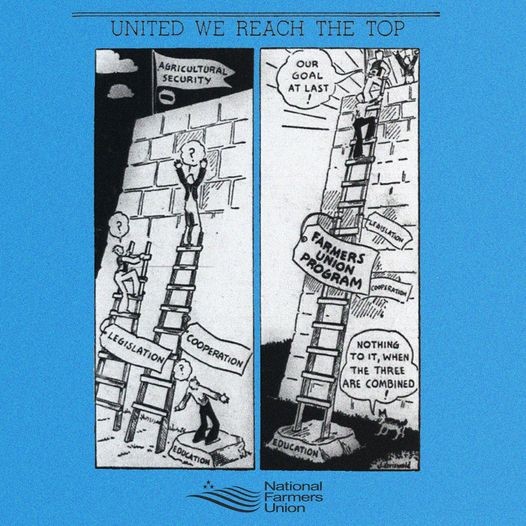
Graphic from The Kansas Union Farmer, January 1940.
A partnership built on education, co-operation & legislation.
For over a decade, the Neighboring Food Co-op Association (NFCA) has partnered with the New England Farmers Union to support the success of our family farmers and fishers, grow the co-operative movement, advocate for agricultural policies that strengthen our regional food system and make healthy local food more accessible for everyone. Central to our collaboration has been investment in education and training.
One example is the National Farmers Union’s Beginning Farmer Institute. This free, year-long training program is designed to improve the health and success of new farm or ranch businesses, build relationships within the Farmers Union community, and is inclusive of all operation types and scales of production. If you know of any beginning farmers who would be interested in this opportunity, please send them to: https://nfu.org/beginning-farmer-institute/ for more information and application. The application deadline for the coming year is December 16, 2022.
And coming up in February, the Farmers Union will host the College Conference on Co-operatives, an annual gathering that educates, motivates, and inspires the next generation of leaders. Over the course of this three-day conference, participants will hear from experts in the field, participate in interactive learning activities and workshops, and tour co-ops in the Twin Cities. The event attracts students from across the country and is beneficial to those new to co-ops as well as those with some previous co-op education. And with support from the Farmers Union and the NFCA, young people from across our region have participated in the conference over the years, expanding their knowledge, connecting with peers, and bringing their enthusiasm for the co-operative model back to their communities.
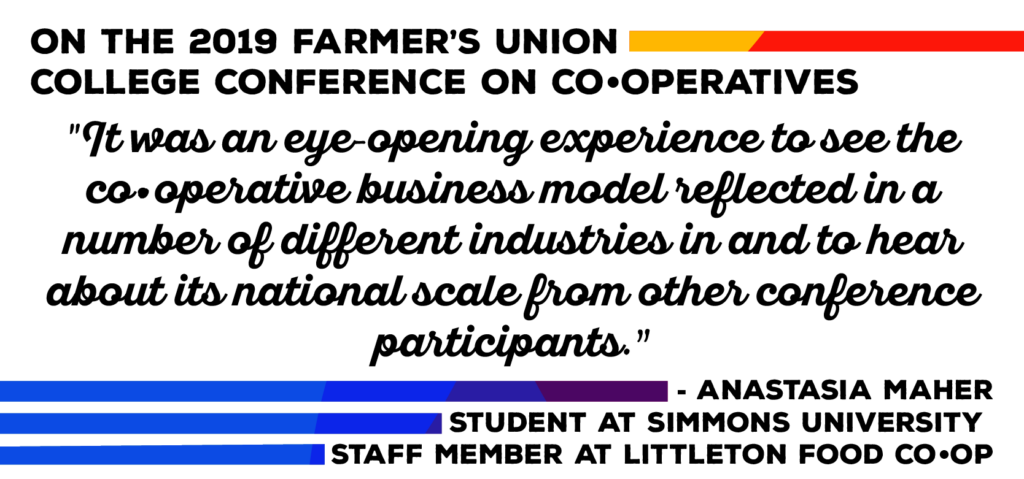
“It was an eye-opening experience to see the co-operative business model reflected in a number of different industries in and to hear about its national scale from other conference participants,” said Anastasia Maher, who attended the conference in 2019 as a student at Simmons University and staff member at Littleton Food Co-op in Littleton, NH. “The best part was being able to reflect on the commonalities of our co-operative experiences; everything from being guided by the same principles to having the same go-to snacks at a food co-op. As a student, it was great to be surrounded by other like-minded students as we reflected on how we can integrate co-ops into our future.”
In addition to Littleton Food Co-op, attendees have represented Greenfield Community College (MA), Willimantic Food Co-op (CT), and multiple students from the Certificate in Applied Research in Co-operative Enterprise program at UMass Amherst.
If you know of college students at your co-op or in your community that would be interested in participating, please direct them to https://nfu.org/ccoc/ for more information. Some scholarship support is available. For questions or for more information, please e-mail info@nfca.coop.
The Farmers Union and the NFCA also work together on legislative advocacy, including protecting the Co-operative Identity in legal statutes, agricultural policy, and food security programs. As a follow up to the recent White House Conference on Hunger, Nutrition & Health, NEFU President Roger Noonan has provided invaluable support as we have worked to navigate changes to the WIC program and strengthen participation by our food co-ops. And with Farm Bill negotiations in the horizon, our collaboration will be more important than ever as we work to ensure that the voices of our region’s farmers, consumers, and workers are represented.
Membership is what makes these efforts happen, and NFCA Member Food Co-ops can join the New England Farmers Union at the special rate of $100. Whether you are a farmer or consumer, urban or rural, the Farmers Union fights for policies that ensure we have a safe and abundant food supply and carries the voice of the rural community to the state and federal legislatures.

National Farmers Union advocates on behalf of nearly 200,000 American farm families and their communities. We envision a world in which farm families and their communities are respected, valued, and enjoy economic prosperity and social justice. Farmers are invited to join the New England Farmers Union chapter – and consumers can join as a “Friend of the Farmer” for just $15. For more information, please visit www.newenglandfarmersunion.org.
Workshop: Taking Action on Principle 6

Join fellow co-operators for an interactive short course to take a deep dive on Principle 6 from diverse perspectives — from the role of associations and federations to business partnerships and supply chains, to the development of new co-ops. NFCA member co-ops receive a discount on registration. For more information, visit https://www.smu.ca/iccm/.

